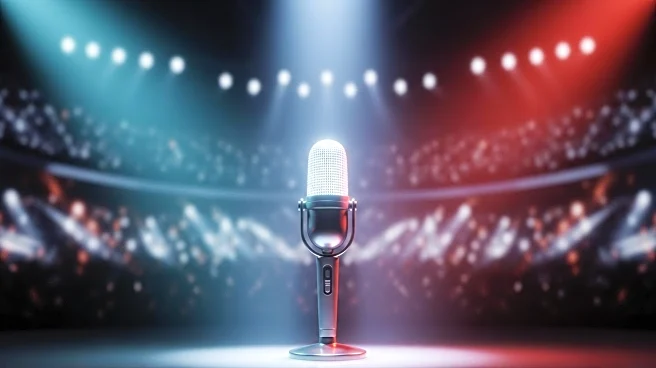What is the story about?
What's Happening?
Russia has reintroduced the Intervision Song Contest, a cultural event originally from the Soviet era, as a counterpart to the Eurovision Song Contest. This revival, spearheaded by President Vladimir Putin, aims to foster international cultural cooperation and showcase Russia's alliances. The contest features 23 countries, including China, India, Brazil, and notably, the United States, indicating a potential thaw in US-Russian relations since President Trump's return to office. The event is seen as a strategic move by Russia to maintain cultural influence despite its ongoing conflict with Ukraine, which has led to its exclusion from Eurovision.
Why It's Important?
The reintroduction of Intervision highlights Russia's efforts to assert its cultural and geopolitical influence amidst international isolation due to its actions in Ukraine. By involving countries from Asia, Africa, and Latin America, Russia is reinforcing its alliances and showcasing its global partnerships. The participation of the United States suggests a complex diplomatic landscape, where cultural exchanges might serve as a platform for dialogue despite political tensions. This development could impact international cultural diplomacy and the dynamics of global alliances, as countries navigate their relationships with Russia.
What's Next?
The Intervision Song Contest may lead to further cultural initiatives by Russia to strengthen its international ties. Observers will be watching for reactions from Western countries, particularly those critical of Russia's geopolitical strategies. The contest could also influence future cultural policies and collaborations, as nations assess the benefits and risks of participating in such events. Additionally, the response from Ukraine and its allies will be crucial in understanding the broader implications of Russia's cultural diplomacy efforts.
Beyond the Headlines
Intervision's revival raises questions about the role of cultural events in geopolitical strategies. It underscores the use of soft power by nations to influence global perceptions and foster alliances. The contest also highlights the intersection of culture and politics, as countries leverage cultural platforms to advance their political agendas. This development may prompt discussions on the ethical implications of using cultural events for political purposes, especially in contexts of conflict and international tension.

















